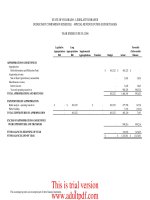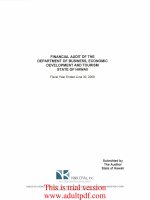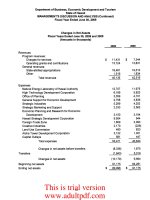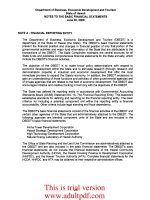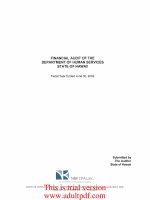LEGISLATIVE DEPARTMENT, STATE OF COLORADO FINANCIAL AUDIT REPORT YEAR ENDED JUNE 30, 2005 AND 2004_part5 pptx
Bạn đang xem bản rút gọn của tài liệu. Xem và tải ngay bản đầy đủ của tài liệu tại đây (57.69 KB, 7 trang )
REPORT ON INTERNAL CONTROL OVER
FINANCIAL REPORTING AND COMPLIANCE AND OTHER MATTERS
BASED ON AN AUDIT OF FINANCIAL STATEMENTS PERFORMED IN
ACCORDANCE WITH GOVERNMENT AUDITING STANDARDS
This is trial version
www.adultpdf.com
GHP Horwath, P.C.
1670 Broadway, Suite 3000
Denver, Colorado 80202
303.831.5000
303.831.5032 Fax
www.GHPHorwath.com
A GHP Financial Group company
GHP Horwath, P.C. is a member firm of Horwath International Association. Each member firm is a separate and independent legal entity.
REPORT ON INTERNAL CONTROL OVER FINANCIAL REPORTING AND ON COMPLIANCE AND
OTHER MATTERS BASED ON AN AUDIT OF FINANCIAL STATEMENTS PERFORMED IN
ACCORDANCE WITH GOVERNMENT AUDITING STANDARDS
Members of the Legislative Audit Committee:
We have audited the financial statements of the Legislative Department, State of Colorado (the “Department”)
as of June 30, 2005 and 2004, and for the years then ended, and have issued our report thereon dated
September 9, 2005. We conducted our audits in accordance with auditing standards generally accepted in the
United States of America and the standards applicable to financial audits contained in Government Auditing
Standards, issued by the Comptroller General of the United States.
Internal Control Over Financial Reporting
In planning and performing our audits, we considered the Department’s internal control over financial
reporting in order to determine our auditing procedures for the purpose of expressing our opinion on the
financial statements and not to provide assurance on the internal control over financial reporting. Our
consideration of the internal control over financial reporting would not necessarily disclose all matters in the
internal control over financial reporting that might be material weaknesses. A material weakness is a
condition in which the design or operation of one or more of the internal control components does not reduce
to a relatively low level, the risk that misstatements caused by error or fraud in amounts that would be
material in relation to the financial statements being audited may occur and not be detected within a timely
period by employees in the normal course of performing their assigned functions. We noted no matters
involving the internal control over financial reporting and its operation that we consider to be material
weaknesses.
Compliance and Other Matters
As part of obtaining reasonable assurance about whether the Department’s financial statements are free of
material misstatement, we performed tests of its compliance with certain provisions of laws, regulations, and
contracts, noncompliance with which could have a direct and material effect on the determination of financial
statement amounts. However, providing an opinion on compliance with those provisions was not an objective
of our audit and, accordingly, we do not express such an opinion. The results of our tests disclosed no
instances of noncompliance or other matters that are required to be reported under Government Auditing
Standards.
This report is intended solely for the information and use of the members of the Legislative Audit Committee
of the State of Colorado and management of the Department and is not intended to be and should not be used
by anyone other than these specified parties. However, this report is a matter of public record and its
distribution is not limited.
September 9, 2005
40
This is trial version
www.adultpdf.com
REQUIRED AUDITOR COMMUNICATIONS TO THE
LEGISLATIVE AUDIT COMMITTEE
This is trial version
www.adultpdf.com
GHP Horwath, P.C.
1670 Broadway, Suite 3000
Denver, Colorado 80202
303.831.5000
303.831.5032 Fax
www.GHPHorwath.com
A GHP Financial Group company
GHP Horwath, P.C. is a member firm of Horwath International Association. Each member firm is a separate and independent legal entity.
September 9, 2005
Members of the Legislative Audit Committee:
We have audited the financial statements of the Legislative Department, State of Colorado (the “Department”)
as of June 30, 2005 and June 30, 2004, and for the years then ended, and have issued our report thereon dated
September 9, 2005. Professional standards require that we provide you with the following information related
to our audits.
Our Responsibility under Auditing Standards Generally Accepted in the
United States of America and Government Auditing Standards
Our responsibility, as described by professional standards, is to plan and perform our audits to obtain
reasonable, but not absolute, assurance that the financial statements are free of material misstatement and are
fairly presented in accordance with accounting principles generally accepted in the United States of America
and the standards applicable to financial audits contained in Government Auditing Standards, issued by the
Comptroller General of the United States. Because of the concept of reasonable assurance and because we
did not perform a detailed examination of all transactions, there is a risk that material errors, fraud, or other
illegal acts may exist and not be detected by us.
As part of our audits, we considered the internal control of the Department. Such considerations were solely
for the purpose of determining our audit procedures and not to provide any assurance concerning internal
control.
As part of obtaining reasonable assurance about whether the financial statements are free of material
misstatement, we performed tests of the Department’s compliance with certain provisions of laws,
regulations, and contracts. However, the objective of our tests was not to provide an opinion on compliance
with such provisions.
Significant Accounting Policies
Management has the responsibility for selection and use of appropriate accounting policies. In accordance
with the terms of our engagement letter, we advise management about the appropriateness of accounting
policies and their application. The significant accounting policies used by the Department are described in
Note 2 to the financial statements.
We noted no transactions entered into by the Department during the years that were both significant and
unusual, and of which, under professional standards, we are required to inform you, or transactions for which
there is a lack of authoritative guidance or consensus.
41
This is trial version
www.adultpdf.com
42
Management Judgments and Accounting Estimates
Accounting estimates are an integral part of the financial statements prepared by management and are based on
management’s knowledge and experience about past and current events and assumptions about future events.
Certain accounting estimates are particularly sensitive because of their significance to the financial statements and
because of the possibility that future events affecting them may differ significantly from those expected.
Management’s use of estimates is disclosed in the notes to the financial statements.
Audit Adjustments
For purposes of this letter, professional standards define an audit adjustment as a proposed correction to the
financial statements that, in our judgment, may not have been detected except through audit procedures. An audit
adjustment may or may not indicate matters that could have a significant effect on the Department’s financial
reporting process (that is, cause future financial statements to be materially misstated).
There were no audit adjustments or waived audit adjustments identified in connection with the June 30, 2005 and
2004 audits.
Other Information in Documents Containing Audited Financial Statements
The audited financial statements have been presented along with required and non-required supplementary
information. The required supplementary information consists of management’s discussion and analysis.
Pursuant to professional standards, the auditors’ responsibility for other information in documents containing the
Department’s audited financial statements does not extend beyond the financial information identified in the audit
report, and the auditor is not required to perform procedures to corroborate such other information. However, in
accordance with such standards, we are required to read the information in such documents and consider whether
such information, or the manner of its presentation, is materially inconsistent with its presentation in the financial
statements. Our responsibility also includes calling to management’s attention any information, which we believe
is a material misstatement of fact. No such inconsistencies or misstatements come to our attention.
The non-required supplemental information, which includes certain combining and other schedules, is presented
for purposes of additional analysis and is not a required part of the basic financial statements. Such information
has been subjected to the auditing procedures applied in the audits of the basic financial statements, and in our
opinion, is fairly stated in all material respects, in relation to the basic financial statements taken as a whole.
Disagreements with Management
For purposes of this letter, professional standards define a disagreement with management as a matter, whether or
not resolved to our satisfaction, concerning a financial accounting, reporting, or auditing matter that could be
significant to the financial statements or the auditors’ report. We are pleased to report that no such disagreements
arose during the course of our audit.
This is trial version
www.adultpdf.com
43
Consultations with Other Accountants
In some cases, management may decide to consult with other accountants about auditing and accounting matters,
similar to obtaining a “second opinion” on certain situations. If a consultation involves application of an
accounting principle to the Department’s financial statements or a determination of the type of auditors’ opinion
that may be expressed on those statements, our professional standards require the consulting accountant to check
with us to determine that the consultant has all the relevant facts. To our knowledge, there were no such
consultations with other accountants.
Issues Discussed Prior to Retention of Independent Auditors
We generally discuss a variety of matters, including the application of accounting principles and auditing
standards, with management each year prior to retention as the Department's auditors. However, these discussions
occurred in the normal course of our professional relationship, and our responses were not a condition to our
retention.
Difficulties Encountered in Performing the Audit
We encountered no difficulties in dealing with management in performing and completing our audits.
Independence
In our professional judgment, we are independent of the Department and its related entities within the meaning of
the AICPA’s Professional Code of Conduct and under Government Auditing Standards. In addition, we are not
aware of any relationships between GHP Horwath, P.C. and its related entities and the Legislative Department,
State of Colorado, and its related entities that in our professional judgment may reasonably be thought to bear on
independence.
This information is intended solely for the information and use of the Legislative Audit Committee, Department’s
management, and others within the Department and is not intended to be, and should not be used by anyone other
than these specified parties. However, this report is a matter of public record and its distribution is not limited.
Sincerely,
GHP HORWATH, P.C.
Scott D. Magnuson, CPA
Director
This is trial version
www.adultpdf.com
44 Report Control Number 1662
LEGISLATIVE DEPARTMENT, STATE OF COLORADO
DISTRIBUTION PAGE
YEARS ENDED JUNE 30, 2005 AND 2004
The electronic version of this report is available on the Web site of the
Office of the State Auditor
www.state.co.us/auditor
A bound report may be obtained by calling the
Office of the State Auditor
303-869-2800
Please refer to the Report Control Number below when requesting this report.
This is trial version
www.adultpdf.com


